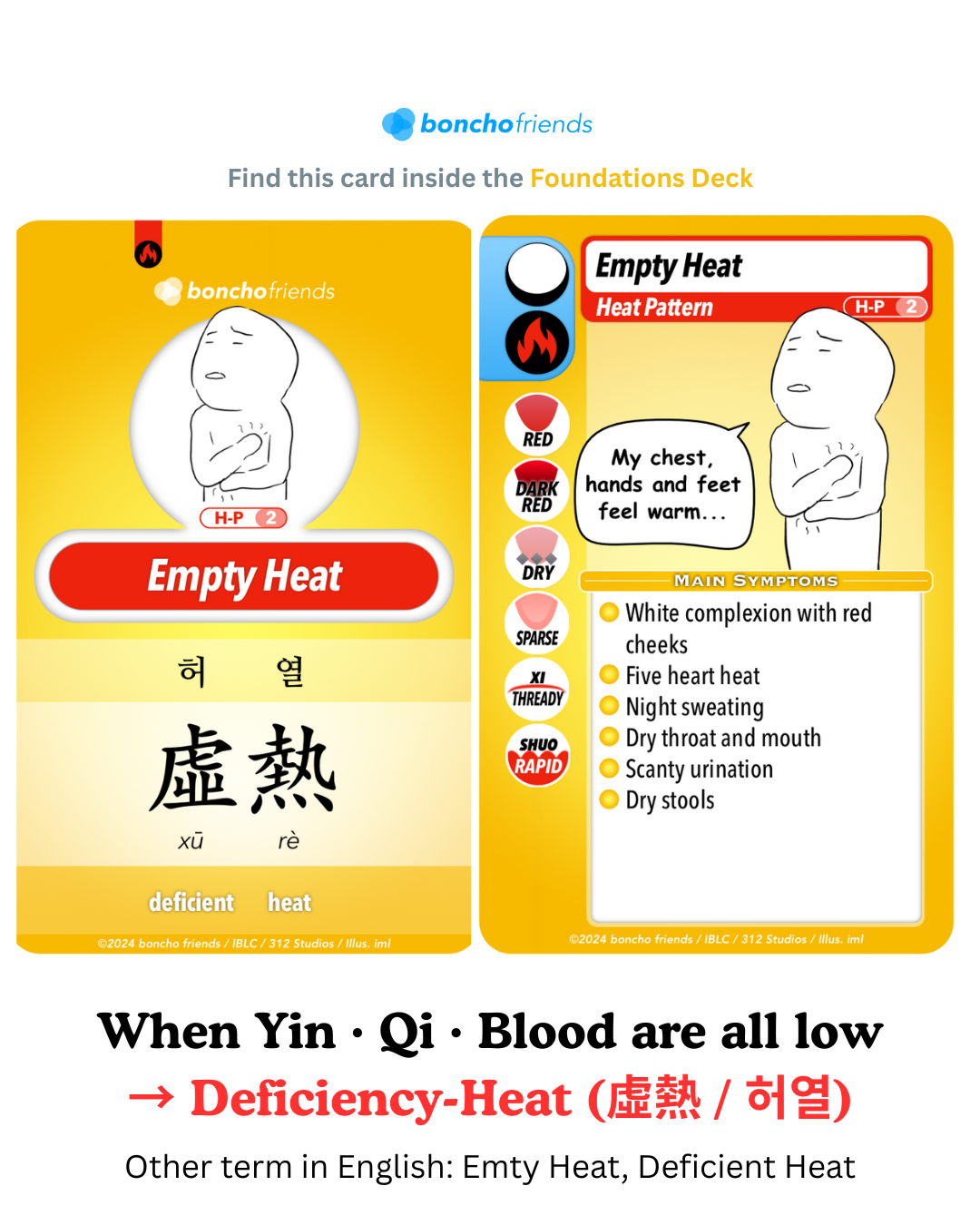
Understanding Deficiency-Heat in Traditional Chinese Medicine
Share
🌕 1. The Heat That Comes From Deficiency
In Traditional Chinese Medicine, not all heat means "excess." Sometimes, warmth rises from within because something is missing.
This is called Deficiency-Heat (虛熱 / 허열) — a type of internal warmth that appears when Yin (陰 / 음), Yang (陽 / 양), Qi (氣 / 기), or Blood (血 / 혈) are insufficient.
That's the classical description of Deficiency-Heat syndrome — the gentle fire of emptiness, not the blaze of excess.
🌸 2. Yin Deficiency Heat vs Deficiency-Heat
Many students use these terms interchangeably — but they describe different levels of deficiency.
| Aspect | Yin Deficiency Heat (陰虛發熱 / 음허발열) |
Deficiency-Heat (虛熱 / 허열) |
|---|---|---|
| Root cause | Loss of Yin fluids | Deficiency of Yin · Yang · Qi · Blood |
| Heat nature | Dry, thin, night-time heat | Gentle internal warmth with fatigue |
| Common signs | Night sweats, five-center heat, dry mouth | Chest oppression (胸中噎塞), dull fullness (痞悶), weak pulse (脈無力) |
| Spirit state | Restless, overheated mind | Clouded, tired spirit |
| Relationship | A sub-type of Deficiency-Heat | The broader umbrella pattern |
🪷 Key Distinction
Yin Deficiency Heat → The body's coolant is low.
🔥 Deficiency-Heat → The whole system runs low on fuel.
💡 For friends who have the Foundations Deck:
To understand Yin Deficiency Heat more deeply, pull out all the Yin Deficiency cards —
for example: Yin Deficiency, Heart Yin Deficiency, Kidney Yin Deficiency, Lung Yin Deficiency, Liver Yin Deficiency, and so on.
Reviewing them together will help you see the full picture and understand the pattern more clearly.
🤰 3. Pregnancy and the Gentle Fire of Deficiency Heat
Pregnancy is Yin-consuming and Blood-redirecting — your body gives its coolest, most nourishing substances to the baby.
That's why many expectant mothers feel mild warmth, thirst, or fatigue. This is Deficiency-Heat — a gentle internal fire born from the generosity of the body.
High or persistent fever, especially before 12 weeks, is not normal and needs immediate medical attention. Always consult both a TCM practitioner and an obstetrician.
🌿 4. Why There's No "One-Formula-Fits-All"
Students often ask:
"Which formula is safe for pregnancy heat?"
The honest answer: none fits everyone.
Pregnancy care must change with each stage — early pregnancy focuses on stability, mid-pregnancy on nourishment, late pregnancy on preparation. Every constitution and pattern is different.
Classical Formulas: Understanding Principles vs Direct Application
Classical formulas like Liu Wei Di Huang Wan help us understand principles of nourishing Yin and clearing empty heat, but many of its ingredients — like Mu Dan Pi (牧丹皮) or Ze Xie (澤瀉) — can move Blood or drain fluids, so it's not recommended during pregnancy.
Instead, TCM practitioners tailor care individually: sometimes with gentle supportive formulas and often with food therapy and lifestyle balance rather than herbs alone.
📚 5. For Herbology Deck Owners and Who Commented on the IG Post!
Because pregnancy care must be handled with so much precision, we created a deeper digital guide!
There, you'll find:
- Stage-by-stage notes on pregnancy support
- Herb safety levels and substitutions
- Practitioner-level critical thinking prompts
We want you to see that TCM is not about memorizing one safe list — it's about understanding the logic behind safety and adaptation.
💬 6. For Everyone Reading This
Pregnancy isn't a single pattern — it's a constantly shifting balance between mother and baby.
When you study or treat, don't just ask "What formula?" Ask, "What's truly happening in this stage, in this body, at this time?"
Critical Thinking at Each Stage
At each stage of pregnancy, it's important for TCM students and practitioners to pause and think critically — here are some guiding reflections to consider.
🌱 Stage 1: Preconception — Preparing the Root (養本)
💭 Practitioner Critical Thinking
- What happens if you tonify Qi but neglect Blood in a patient with scanty menses?
- How would your formula change if this patient also had signs of heat (irritability, thirst)?
- Why is emotional regulation part of fertility support in TCM theory?
🤰 Stage 2: Pregnancy — Protecting the Fetus (安胎)
💭 Practitioner Critical Thinking
- A patient with mild nausea and fatigue asks for herbs — do they need herbs, or can food therapy suffice?
- How would you differentiate between "unstable pregnancy from Qi deficiency" and "threatened miscarriage from heat in the Blood"?
- When modifying a formula like Jiao Ai Tang, how do you decide dosage and duration?
👶 Stage 3: Postpartum — Restoring the Source (調養)
💭 Practitioner Critical Thinking
- How long would you continue Sheng Hua Tang before switching to Si Wu Tang?
- Why is timing crucial when moving blood postpartum?
- What signs tell you a patient needs Kidney support after birth (You Gui vs. Zuo Gui approach)?
Closing Thoughts
Deficiency-Heat (虛熱 / 허열) reminds us that warmth can come from emptiness, not excess.
Pregnancy amplifies that truth — it's a time of sharing, of giving, of quiet internal generosity.
Let's keep studying with care, compassion, and critical thinking 🥰
Traditional Chinese Medicine Education Resource
For educational purposes only. Not medical advice.

1 comment
It is very useful information. Thanks a lot